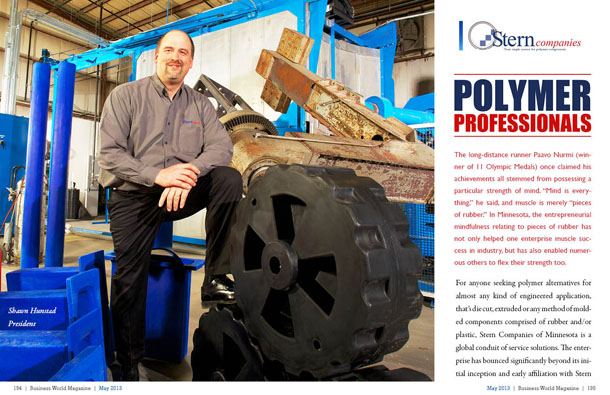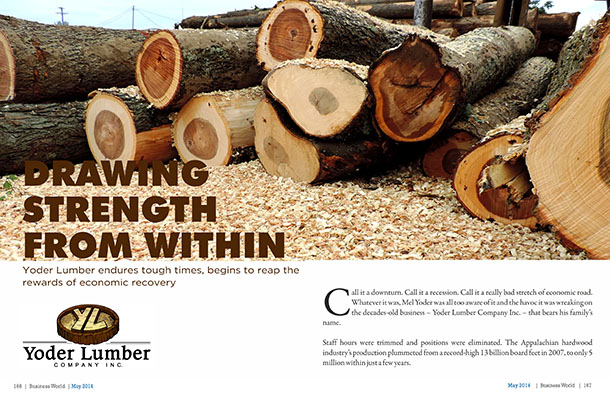

Goodyear opened its first Canadian store in a small Toronto building in 1910. They established their Canadian operations later that same year, starting out in the bicycle, carriage and the developing automobile industry. Since that historic occasion, the company has grown exponentially – expanding its product lines and earning more success every year. Goodyear Canada now has multiple manufacturing facilities and offices across the country.
â€One of the reasons that Goodyear is unique and very dominant in larger trucking fleets is the fact we provide more than a product,†says Dwight McGill, General Manager, Commercial Tire Systems, Goodyear Canada. “We actually provide business solutions. We realize that there are other manufacturers that make tires, so to differentiate ourselves, we’ve focused heavily on bringing solutions to trucking fleets.â€
The first Goodyear plant to open outside of the United States was in Bowmanville, Ontario. Near the Grand Trunk and Canadian Pacific rail systems, the plant was in a perfect location because it had access to nearby exporting and importing facilities. There were also enough skilled people close at hand to help in the production of Goodyear’s top-quality products.
Goodyear’s employee base has only grown more skilled over time. Today, McGill is one of those skilled workers – a part of the nearly 1,400 people employed by Goodyear Canada nationwide. He has been with the company for nearly 25 years, having come from a transportation background and owning a trucking company in Manitoba. He got involved in Goodyear Canada when they approached him. “I had been buying product from a small chain of stores in Manitoba that sold another company’s tires, and Goodyear bought the chain out,†he recalls. “They asked me if I was concerned about going to Goodyear and I said, ‘No, I really buy from the service provider rather than the brand.’â€
Goodyear passenger car tires are sold through various retail channels across the country – including hundreds of committed tire retailers and mass merchandisers like Canadian Tire and Wal-Mart. Goodyear commercial truck tires – such as those used on long-haul trucking fleets, plus pickup and delivery trucking fleets – are also sold through a network of independent tire dealerships.
Part of what makes Goodyear a top-quality brand name in the auto and trucking industries is its ability to stay at the leading edge of tire technology. This includes focusing on providing increasingly eco-friendly products. As part of that focus, the company offers numerous fuel-efficient tires, including products that contain its popular Fuel Max Technology, which can help trucking operations reduce their fuel consumption.
Other green initiatives employed by Goodyear include retreading, which is a big part of the company’s operations. A retread is a previously worn tire, which has gone through a remanufacturing process designed to extend its useful service life. “Retreading is probably as green as a tire technology can get. With a retread, you’re not throwing away that tire casing and you’re getting two, three lives out of it,†McGill says. “So that’s huge when it comes to going green and looking at saving our landscapes and not filling up our landfill sites.â€
“When you’re  retreading that same casing, you bought that casing once so why not run a new tread on it three or four times?†he adds. “A tread costs about probably 60 per cent of a new tire, so not only are you saving money, you’re working green and helping the environment.â€
Another way in which Goodyear stays at the leading edge of new technology, is their proprietary DuraSeal Technology, which help fleets stay up and running longer. DuraSeal is the world’s first built-in tire sealant for commercial truck tires that instantly seals tread punctures without time-consuming or messy application of aftermarket sealants.
McGill says DuraSeal is probably “one of the most advanced technologies†the tire manufacturer utilizes.  “DuraSeal definitely helps trucking fleets. It’s huge to have a technology that doesn’t have to be taken off or be repaired,†he says.
As the trucking industry changes and as government regulations change, McGill says companies must look at doing things differently.  He says Goodyear has to respond to those changes, even if it means making tires differently. “You have to be a proponent of change because the industry changes, and if you want to change as quickly as the industry, then you have to be at the top of your game to keep up,†he says.
As for what’s looming on the immediate horizon for Goodyear, McGill says the company’s primary focus from a commercial tire standpoint will be servicing fleets, as well as looking to different segments within the industry for feedback and new information. Despite the industry-leading position Goodyear has   established with the public over the years, he says the company will continue to push forward with new technologies, products and services that directly address the needs of trucking fleets and other customers. This includes continuing to build partnerships with customers, while still providing them with optimal value.
“We recognize the fact that customers in the trucking industry need more than just a product provider,†McGill concludes. “They need a business solutions provider. That’s why they need to partner with companies like Goodyear, That’s a win-win for fleets, truck manufacturers, the overall industry, and the environment.â€







